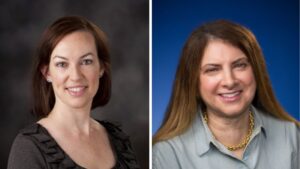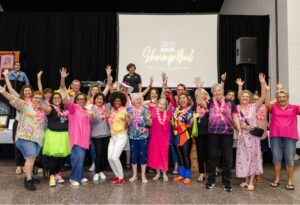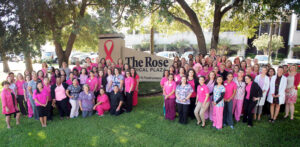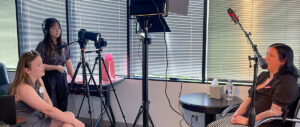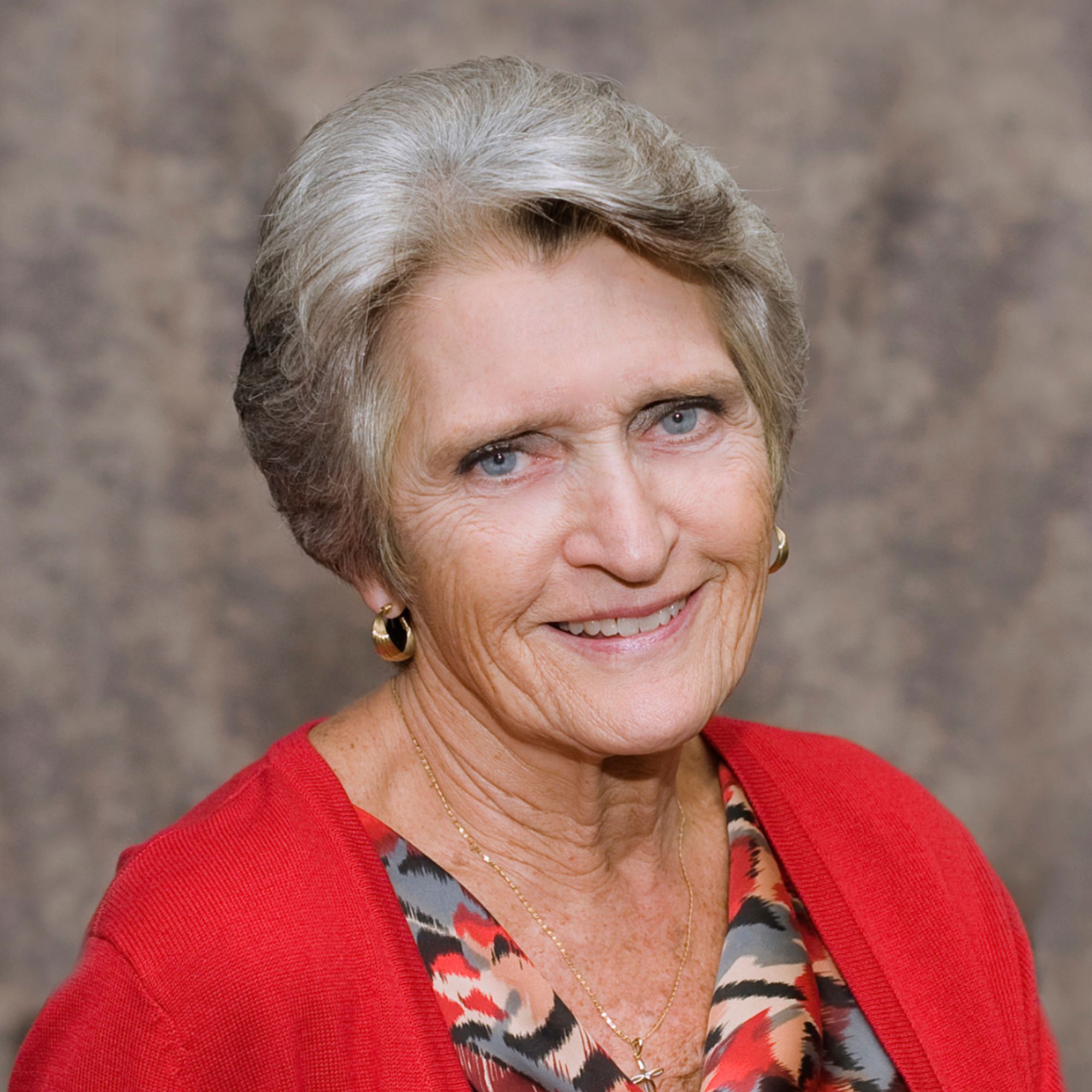Dorothy: [00:00:00] Let’s Talk About Your Breast, a different kind of podcast presented to you by the Rose, Breast Center of Excellence and a Texas treasurer. You’re going to hear frank discussions about tough topics and you’re going to learn why knowing about your breast could save your life. Join us as we hear another story and we answer those tough questions that you may have.
We are here today. Um, Let’s Talk About Your Breast and and I’m Dorothy Gibbons, CEO and co founder of The Rose. And I am here with my wonderful other co founder, Dr. Dixie Melillo, who, uh, this is, this is an important topic for everyone, we feel like. And it’s, it’s about what you’re eating could be killing you.
So, Dixie, you started The Rose, uh, We started the Rose. In [00:01:00] 1986, we had a, you were just on a mission to be sure women knew the importance of mammography, the importance of self exam, and how much breast cancer can be taken care of if we just find it early. I mean, your, your famous, famous advice is don’t be afraid of finding breast cancer, just be afraid of finding it late.
So, and, and, that was a whole bunch of whatever you did. I mean, you were just consumed with this breast cancer awareness. And then, I remember what a visionary you were because not only did you see that there had to be a role for someone, somewhere, taking care of the uninsured, But, and the importance of education for women.
But then, mmm, mid 80s, late 80s, somewhere in there you started putting, correlating the, the hormones, the long term doses of hormones with breast cancer in older women and many women. [00:02:00] And you started counseling your, your patients about hormone replacement therapy. And, uh, I know back then that was not popular.
And many doctors were not happy with you telling their patients that they shouldn’t be doing that. So, so now you have a new mission. And I know that, um, so much has been impacted by the way that you’re seeing. food now, the way that you’re thinking of nutrition. So take us back a little bit. When and why did you first get interested in this?
Dr. Dixie: Well, I think, you know, basically the focus of medicine has changed in medical school. They teach you figure out what the disease is, give it a pill or cut it out. I mean, that was the focus when I went to medical school in 1970s. [00:03:00] And so I did surgery for 40 years. I took it out. Well, when I got too old to do surgery and my back was bothering me, I really got more into the diagnostics here.
And, uh, and, and it was. I mean, yes, you know, diagnose it early and find it early. But my gosh, we were diagnosing 20 year olds, you know, and, and, uh, and more of them because of the population we see. And. I thought, and at this time though, they’re not estrogen sensitive, they’re not progesterone sensitive.
These are triple negative bad actors in young people.
Dorothy: Right.
Dr. Dixie: So you have to go, what is going on?
Dorothy: Now tell us just a little bit what exactly that means, what you just said.
Dr. Dixie: Well, that means most tumors are dependent on estrogen. They have to have it to grow. But we have recently seen a subset of these tumors that are on autopilot.
They don’t [00:04:00] need estrogen and you can’t suppress their growth with an anti estrogen. So they are just aggressive. They grow fast, they spread fast. And they have really kind of taken us by storm in the young population.
Dorothy: And triple negative means it’s negative for?
Dr. Dixie: Estrogen, progesterone, and HER2/neu.
Dorothy: Right, so those are the typical treatment plans.
Dr. Dixie: It’s just chemo. You get that, you go to chemo. I mean, they don’t even worry about surgery until you’ve had your chemo. I think they’re getting a little bit more educated with who needs it and doesn’t now. In the early, you know, 2000s, I mean, it was like, Mmm, you gotta just go to chemo.
Dorothy: And triple negative doesn’t always have the best prognosis.
Dr. Dixie: No, it has the worst.
Dorothy: Yeah.
Dr. Dixie: It’s getting better, though, because we really are catching it early. We finally have woken up that young people get breast cancer, and if they, you know, if they feel a lump, at least look at it.
Dorothy: Right.
Dr. Dixie: So that, but, I got interested in the food aspect of this. [00:05:00] When, uh, both of my parents came down with dementia.
At 86, I mean these are two people that There’s been no dementia in my family. I mean and I got to thinking what in the world’s going on.
Dorothy: I remember your mother was just the most active person I ever knew. She was doing the garden and doing, I mean, she didn’t stop, she was on the go all the time.
Dr. Dixie: No, and my dad, you know, God love, no, they weren’t, you know, they, I mean, I come from a very ordinary background.
My dad had a high school education and he was a career Air Force. My mom dropped out in the eighth grade to take care of her siblings because her mother was sick. So they weren’t like, you know, people who are ever going to have access to this knowledge. And when they were both 86, you know, they. I noticed mother was kind of running over curbs when she drived.
Then my dad hit a, uh, a car, broadsided it, and said he didn’t stop at square stop signs. And I’m going, we got a problem. [00:06:00] You know? And so, halfway, because I don’t want to go there, you know, I was researching, why in the world would do this? Dr. David Perlmutter. Awesome, awesome neurologist. He had really started putting together at that time that sugar causes Alzheimer’s.
And it does. It does. Most of Alzheimer’s could be prevented if you eliminate the sugar from your diet. And, uh, I mean, Alzheimer’s is is actually like type 3 diabetes. It’s insulin resistance of the brain. The brain has to have, it loves sugar, it wants sugar, but it gets insulin resistance just like every other tissue in your body.
And if it doesn’t get to sugar, it shuts down. Well, my parents, bless their heart, every meal was potatoes, corn, Blue Bell ice cream, and some cut of meat beaten beyond recognition with Mother’s silver hammer and fried in Crisco. And, uh, and I really said, you know, and I noticed all they craved was sugar. [00:07:00] So that’s how I got interested in what all sugar does.
And back in the 1930s, Otto Warburg, Okay. He knew this. He showed them. The only thing a cancer cell can eat mainly is sugar. You know, there’s, without getting too technical, in, in the, in the cell, there’s a little organelle called the mitochondria. And he takes the food and he makes the energy for the cell.
A cancer cell is just a cell with a broken mitochondria. He no longer works. He lays down on the job. He says, I can’t do this. I can’t produce energy. Well, then the part, first part, the cell will keep sucking in sugar and he’s sugaring divides and he’s sugaring divides because it’s trying to stay alive and it can’t do anything else but stay alive.
So it just keeps growing and growing and sucking in sugar. You know, we used to, We used to be so high [00:08:00] on that genetics was the cause of cancer. Genetics is it. I mean, if you’ve got this gene, you’re gonna get it and this is that. And now, honestly, we’re really finding out that most cancers are very diverse in their genetics.
I mean, even the same tumor in the same person and the tumor in the metastasis, all of it, there will be so many variations of the genetic make up of this tumor. But the one thing all cancer cells have in common, breast, colon, everything, their mitochondria don’t work. So they have to have a lot of sugar.
Well, sugar does a lot of other things too. In the immune system, uh, like as little as 10 teaspoons of sugar will paralyze your immune system for up to five hours. And that, the cells that are supposed to being out there, and there, there’s, everybody makes cancer cells. Everybody. We have them all the time.
[00:09:00] But if you, if things are going well, you’re not overfeeding them, and you’re not suppressing your immune system, then you’re, you have these little cells that are like Pac Man. They’re roaming around, and they’re looking at everybody, and they say, oh, oh, he’s broken. And if the mitochondria doesn’t work, and they know he’s broken, They just engulf him, and they, they chew him up, and they take his parts, they recycle.
I like that about them. I’m an avid recycler. But anyway, they take his parts, and they make a new cell. So they’re constantly recycling. Well, unfortunately, 80 percent of your immune system is in your gut. And when we’re constantly eating, and when we’re constantly poisoning them, With sugar. Sugar is very toxic to the mitochondria.
They’re not going to get out there and look for more work. I mean, coming down the pike, there’s all these, these bacteria, there’s, you know, there’s [00:10:00] toxins. They spray your bread, your, your wheat, your corn, and your soy is sprayed with Roundup. They have to, they have to get rid of that. They’re very, very busy, you know.
Uh, so you, you really shot yourself in the foot when you, you know, you eat a lot of sugar and carbs.
Dorothy: You’re talking about the immune system. Everybody’s immune system
Dr. Dixie: Everybody’s immune system.
Dorothy: Yes.
Dr. Dixie: Everybody’s immune system. It’ll work very, very efficiently. And that’s why the folks, the obese diabetics, don’t do well with COVID.
Because they can’t get out there and shut the virus down. These little pac men also eat viruses. They eat bacteria. They eat anybody who’s not supposed to be there. And they’re on alert. Oh, that’s a bad guy. You know, we gotta go get him. But if you compromise them, and exercise is the best, best way to energize your immune system.
But if you’ve noticed, most people spend all of their time on a computer and on little screens. The children don’t even get out and [00:11:00] exercise anymore.
Dorothy: I mean, there is a reason why. What is it now? 43 percent of all of the, uh, adults in the United States are obese. And, and why, you know, there’s so many factors that go to that, but exercise is a huge one.
Dr. Dixie: That’s right.
Dorothy: Yeah.
Dr. Dixie: And when I was in medical school, it was like 2.5 percent of diabetes. Now it’s like 88 percent of the American population is metabolically unhealthy.
Dorothy: Right.
Dr. Dixie: And all of your healthcare dollar goes there.
Dorothy: That’s true.
Dr. Dixie: You know, these are chronic, non communicable diseases caused by lifestyle.
Dorothy: Right.
Dr. Dixie: We’re talking cancer, diabetes, heart disease. Triglycerides are just a piece of sugar that the liver wraps in fat to get them out of the bloodstream. It always goes back to the sugar.
Dorothy: And even children have non alcoholic fatty, uh, livers.
Dr. Dixie: Yes, in fact, um, Robert, [00:12:00] Dr. Robert Lustig, he is awesome. He’s another one of my pearl muttered gurus that I listen to every morning while I’m on the elliptical for an hour at 3:30 am in the morning. But, um, He’s a pediatric endocrinologist. And they were sending him children in the 1990s to see, well, why are these children gaining weight? What, what’s going on? Is there something in their brain? You know? And, I mean, he looked up, looked down everything, and he figured out, you’re just, you know, you’re feeding them junk.
Dorothy: Right.
Dr. Dixie: That wasn’t the word he used. But, uh, and now about 20 percent of our kids, 20 to 40 percent of American children have fatty liver. The leading cause of cirrhosis now is sugar. It is not alcohol. He’s got kids that are getting liver transplants because of cirrhosis.
Dorothy: Right.
Dr. Dixie: That’s a sin. And the main leading cause of this problem with the liver is soda pop.
Dorothy: Mm hmm.
Dr. Dixie: High fructose corn syrup.
Dorothy: So tell us, tell us, that’s so important [00:13:00] Dixie, about Where sugar is put. I mean, you know, we, we think we’re reading the nutrition labels on our products that we see, but it’s like it’s insidious. It’s everywhere. So give us some examples about places that we wouldn’t expect to find sugar.
Dr. Dixie: Just everywhere. But like Dr. Lustig says, you know, it’s not the food that’s bad. It’s what the people do to the food.
Dorothy: Yes.
Dr. Dixie: You know if it comes in a box or a sack or or people have touched it or if it’s got more than one or Two ingredients on it. And if you’ll notice always this added sugar added sugar Added sugar is high fructose corn syrup because it’s cheap It’s readily available your tax dollars My tax dollars your tax dollars our tax dollars goes to subsidize corn to make high fructose corn syrup And these growers, all of these people, you [00:14:00] know, they’re supporting the salaries and the campaigns of the congressmen and the senators.
And if you think that they’re going to put, you know, a squawketus on this corn and this wheat and that stuff, they’re not going to. You know, we the people, again, we the people are going to have to quit buying this crap. The food industry will sell you anything you want. They don’t care. But if you want good food, that’s what they’re going to sell you.
And the only way you’re going to tell them, we want good food. Is to quit buying the junk and poisoning yourself. And you know, especially in Hispanic and, and, uh, black communities, they just don’t have access to high quality food.
Dorothy: Yeah. Fresh food.
Dr. Dixie: Yes.
Dorothy: Especially vegetables.
Dr. Dixie: And God love them. They’re working two and three jobs.
What are they going to do? They’re going to go buy, you know, the fast food restaurant and get fast food. And I understand that. But I think Just like my parents, I think a lot of them don’t know, and now it’s true. Now, most of the people I talk to and tell this to, it [00:15:00] doesn’t make any difference, you know, because sugar is one of the most powerful addictions in the world.
It hits the same place in the brain that heroin, opioids hit. It’s the pleasure center, the reward center, okay? And it’s an addiction. When people say, Oh, I just don’t feel good if I get off sugar. It is. There’s withdrawal when you get off sugar. And the manufacturers know this back in the, in the, the seventies and the eighties, they, they perpetuated this lie that it was fat that was causing heart disease.
And well, my dad, my dad had a massive heart attack at 43, had a quintuple bypass. My grandfather had lost his farm at 39 because he had a heart attack. My brother died at 50 of a heart attack. His son died at 41 of a heart attack. And my 58 year old son has had a [00:16:00] heart attack and has three stints. Okay? So, yes, there’s a genetic predisposition.
But, they all had in common that they ate junk all the time. Now, luckily, my son has changed his ways. He’s seen the light, but, you know, I mean, but I’ve never had a problem in the world with my heart. I take no medications. I have no aches or pains. I, there’s nothing wrong with me, you know, but for 26 years now, I’ve been doing this low carb and exercising.
You know, I mean, 76, I, I, I can’t even, unless I look in the mirror. Then I know I’m 76 if I look in the mirror, but for me in here looking out, I feel fine, you know, but.
Dorothy: So let’s go back to, I know you had sugars and everything, but let’s. How do you, how do we know that? I mean, I know we can take your word for it.
You always research [00:17:00] things very, very deeply. So I know that you’d never tell your patients something that you didn’t feel strongly about and that you had really looked into. So, you know, a lot of people don’t quite get it about processed foods. And one reason why it’s so important right now is because of the huge jump in people buying processed foods because of COVID.
They were staying home. And we would have thought maybe they would have been cooking meals, but no, we get the packaged meals. Um, you know, I think processed and I think, oh, well, that’s lunch meat, but not necessarily.
Dr. Dixie: Bread is processed. It’s processed wheat. They take the whole grain and they throw it away and they give you, then they take the starch, which is meant to make new little wheat plants, they take it.
And they put it into bread One slice of “whole wheat” (quote-and-quote) bread will raise your blood sugar More than a snickers bar.
Dorothy: [00:18:00] Wow.
Dr. Dixie: And if i’m going to cheat i’m going to have a snickers bar, okay I’m not going to have a stupid piece of bread, right? the starchy vegetables potatoes corn You know pasta rice that all It puts a lot of sugar into your bloodstream.
If you’ll notice the pro When they took the fat out of the food and then and told you to eat, you know, carbs, fat is what gives food its flavor. When you take the fat out, you gotta add something, or else people are not gonna eat this cardboard stuff. So they added sugar. I mean, ketchup has a tremendous amount of sugar in it.
And who would think ketchup made from tomatoes?
Dorothy: Now that’s a good example.
Dr. Dixie: Uh huh. I mean, excuse me? You know, and all of these, um, all of these packaged, uh, quick meals, they’ve all got added sugar. I mean, anything that man has touched. I mean, what I tell my patients is eat things that look like food. You know?[00:19:00]
Eat things that are vegetables, eat things that are fruit, you know, uh, nuts, um, avocados, you know, lean fish and chicken and, and, you know, stuff that looks like food, not something that, that man has processed. And they’ve done some, such a disservice with the meat industry. You know, honestly, red meat, there’s, there’s nothing inherently wrong with grass fed beef.
But when they put them into a feedlot, and what they give them is corn to fatten them up. Corn will kill a cow. So therefore you have to get a ton of antibiotics to that cow to keep the corn that you gave it to fatten it up from killing it. Hello?
Dorothy: Right, right.
Dr. Dixie: And then when you eat the meat, you get the antibiotics.
And then you kill your microbiome, 80 percent of whom, may I say it again, is your immune system. Come on.
Dorothy: Right, right.
Dr. Dixie: I mean, it’s just what we’ve [00:20:00] done to ourselves is insane.
Dorothy: That, and much of this we aren’t even aware of. We don’t take, we really aren’t aware of it. And, uh, like you said, this, this is a huge problem that’s beyond the individual.
So let’s go to what the individual can do. You’ve given us some examples, but tell us more about what that person can change in their diet that would change. that would make them healthier, that, you know, they could feel comfortable about what they’re eating.
Dr. Dixie: Well, I think one of the most important things, and I’ve adopted this a while back, that really helps, and it’s not for everybody.
This is not medical advice. If you are an insulin dependent diabetic, do not go there. But intermittent fasting. Don’t eat anything till noon. Give your gut a chance. Just like your brain has to sleep, your gut needs to rest. We were not designed by the Creator To have food going in our mouths 24 7. We [00:21:00] just weren’t.
So, basically, I don’t eat anything till noon. And at noon, now, of course, I’m not a person who has to have fancy food, you know. At noon, I’ll have an avocado and maybe some salmon. Around 3 o’clock, I’ll probably have some berries, you know. And then in the evening, I’ll have a salad or, you know, vegetables and chicken.
But eat things that look like food, you know. Don’t, and the, the hamburger meat you buy, the, you know, that when you go to some of these fast food places, we won’t, which will remain a name, but if you go to these places, you’re going to get the cheapest beef. It’s going to be grown in feed lots, you know, everything that, and they have to, to make money.
Dorothy: Right.
Dr. Dixie: I mean, that’s why they, they make money, but, but the stuff that they feed you is really very damaging. You know, if it’s. And we spend billions and billions and billions on research for one drug that only treats the symptoms. There’s not one diabetic drug [00:22:00] that cures diabetes. None. They just keep your blood sugar from getting too high.
Dorothy: And still, if that same person went on a sugar free—
Dr. Dixie: You can absolutely, type 2 diabetes is absolutely reversible with diet. If they would spend one tiny inkling of the money they spend on these drugs, researching them, If they would spend that on telling the people, come on gang, you don’t have to go there.
Don’t get sick. Then you won’t suffer. Then you won’t have to take these drugs that, if, when you listen to the side effects, oh my gosh, you go, yeah, been a dream of mine to commit suicide and run off the road and, you know, all these things that these drugs cause. And it’s such a sin that they’re giving these drugs to children.
You know, A lot of the, all the stuff they talk about, eczema, psoriasis, all that is caused from leaky gut. Because if you don’t feed your bacteria and you don’t take care of it, it will eat your gut lining. And then the poisons will get out of your gut into [00:23:00] your bloodstream and just go around and have a good time.
And your immune system goes haywire trying to kill them. So it, you know, so then, their solution is to give a drug that kills your immune system so that it doesn’t keep attacking your cell. I mean, when they, when they show these children on commercials, show my skin, not me. I mean, it breaks my heart because I know they’re giving them a very dangerous medicine.
They’re hurting that child’s immune system, which he will need that to fight other things other than a skin rash.
Dorothy: Right. Right.
Dr. Dixie: We’re just going down this really dangerous road.
Dorothy: Well, now what can John Q. Citizen do to change that?
Dr. Dixie: Well, I’ll tell you what I’m trying to get John Q. to do. Okay. Every time I see a patient, I have a, I have a whole thing about the evils of sugar.
Dorothy: Mm hmm.
Dr. Dixie: I give it to them. I realize most of them will go into the trash. They probably won’t [00:24:00] even hit paper recycling. But, I ask them to please read it. Please share it with your friends and family. Put it on your social media. Everybody loves social media. Instead of telling them what you ate for dinner, or how many times you washed your nose or something, tell them, tell them about the dangers of sugar.
And, I give them, you know, I ask them, please help me, help me, I can’t, you know, no one, no, the higher ups are never going to help us. They’re not, because there’s no money in it. There’s no money to be made by eating right and exercising. Unless you sell treadmills or something, I don’t know. But, but you can’t get any mass interest in it.
And, and the pharmaceutical industries spend so much money on the three major stations. You know, ask your doctor about commercials. That if any of those stations, and, and Robert Lustig describes some of this in his book. If any of those stations run too many, you know, preventative [00:25:00] ads. They’ll, they’ll pull their products, so they kind of have them that they can’t do a lot with prevention.
I mean, and unfortunately, the medical community, and I know I’m going to take a lot of flack for saying this, has become a business. Almost all doctors are in business associations. I mean, I’m probably the only solo practitioner left in Houston. No, I know there’s others, but not many. And when you’re in a business practice, you’ve got to produce.
You can’t spend a lot of time with a patient. You get 12 minutes per patient, which is the average. You can only have one problem. If you have more than one problem, they call it a diagnostic and charge it more. They don’t have the time to sit down and tell you about it. That’s why I was so excited about this doctor I found at Clinica Familiar.
My patient told me, Oh, he sat down and he told me all about that. If I got this [00:26:00] diabetes, I said, Oh my gosh, what’s his name? I have to go see him. I have to talk to him. But, you know, I guess I watched too much Marcus Willoughby as a kid. I don’t know. But I just really feel like we’ve got to protect our patients.
We’ve got to protect them, you know? Especially my precious little, you know, I mean, like I told you, I’m, I’m, I’m partial to the Hispanic community because God sent me to Spain when I was a kid to learn Spanish. And I know that he meant for me to be able to talk to my people, you know? And, uh, and they’re just getting wiped out with cancer.
Dorothy: Oh, so true.
Dr. Dixie: Breast cancer is eating them alive. And, uh, I have all of this stuff translated into Spanish, so I give it to them in Spanish.
Dorothy: And certainly anyone—
Dr. Dixie: And they do social media. They do.
Dorothy: They do. Anyone that has, that wants to see any of this list of reading materials, the books, the [00:27:00] sugar discussion, certainly can contact therose.org and we can get them to
Dr. Dixie: Hey, you get a copy.
Dorothy: Oh, yeah. Oh, yeah. So, Dixie, I, I know that you’re trying to talk to that person, but we, we need to take it a higher level and talk to some of those that make the policies of this world.
Dr. Dixie: I’ll talk to anybody that listens. They just don’t, they don’t,
Dorothy: yeah.
Dr. Dixie: I don’t know.
And, and I think that if we rattle enough cages at the lower level, somebody’s going to listen.
Dorothy: Yeah, there’s, there’s a huge uprising going on with the man on the street, the woman on the street who’s saying, I don’t want to do this anymore. I don’t want to take this. Yes.
Dr. Dixie: They just don’t have the knowledge.
Dorothy: So, envision for me a world where everyone really did eliminate sugar, really did avoid the wheat, all of the things that you’ve been talking about. What would that world look like? How long would people live? How would they feel?
Dr. Dixie: Well, see, that’s it. I mean, most Why would you want to [00:28:00] live a long time if you can hardly move around, you’re on a walker?
You, you can’t remember your name. You’re locked up in a little room because you’re probably going to wander off. And then people quit coming to see you because you wouldn’t remember it anyway. And, you know, we, what we have to focus on is not lifespan, but healthspan. That’s good. Staying healthy. Right. You know, I mean, I, I tell people this and I know they think I’m nuts, but I’m having more fun in my seventies than I ever had at any time because I really don’t.
I don’t care too much. I’m independent of the good opinion of other people. And I’m having fun. I got my first Harley Davidson at 65. You know? And, the scary thing is when I go to some of these biker bars and some little girl comes running, Dr. Melillo! I go, oh no, no, not me, oh no, no, no. And, uh, but you know what I mean?
Life is good if you feel good.
Dorothy: Oh, Absolutely.
Dr. Dixie: It’s not good if someone else is running your [00:29:00] life. They, you know, they’re making your decisions and you have no power over your own life. And, and, I just want people to know that this is within reach. You don’t have to be sick and old.
Dorothy: Right.
Dr. Dixie: Now you gotta be old, but you don’t have to be sick.
I don’t mind being elderly, but don’t call me feeble. Mm mm. I can lift 50, 50 pound horse sacks of feed all day long. I put 22 of them up the other day, so. Still have your horses, eh? Oh, there’s only four left and they’re all in their thirties. They’re geriatrics, I know. But they’re fat and happy and they’re having a good time.
Yeah. So, I’ve had them all their life. I birthed them right there, so. Yeah.
Dorothy: Alright, now I know you came with some other things to tell us. What have we not covered?
Dr. Dixie: Oh, basically, I don’t know. I talk so much, I think I got it pretty well covered. You know, I mean, I wish people would look more into You know.
[00:30:00] When you eat sugar and sweets, you release insulin. Insulin’s a growth factor. It not only makes you grow, you know, in, you know, in fat tissue, it makes cells grow and it stimulates the growth of cancer. You know, cells want to divide when they get hit with insulin. And breast cancer cells never become insulin resistant.
The rest of the body can be so insulin resistant, it’s not funny, but they’re going to suck up sugar.
Dorothy: Ah, interesting.
Dr. Dixie: I mean, you’ve heard of a PET scan, right? Do you know what they give you to, what they inject you with for a PET scan so that you can outline the cancer and see it real pretty?
Dorothy: Tell us.
Dr. Dixie: Radioactive sugar. Because the cancer cell will take up to hundreds of times more sugar than a normal cell, and so that radioactive sugar just gets sucked into that cancer, and it gives you a pretty picture of it. There’s just so much to—
Dorothy: There’s so much valuable information out there that’s keeps showing us.
Dr. Dixie: And it’s, it’s, it’s accessible.
[00:31:00] Just, you know, I’m electronically challenged. I don’t have a computer at my house. But I get on my phone and I say, Hey Siri, Show me videos by Dr. David Perlmutter. Show me videos. Don’t say YouTube, cause then you gotta buy stuff. But, anyway, if you just say show me videos, and I get up at 3:30 am, I do my elliptical for an hour, I put my phone there, and I listen to this stuff.
You know, every morning. It’s free, it’s easy. And these people have the best podcasts, and they tell you all this. Anybody can access this. And it is not like, only for doctors. It is for human beings. Robert Lustig’s book, “Metabolical”, is the book I recommend if you don’t read another book in the world, read that.
And if it doesn’t make you mad about what’s going on, what they’re doing to us, then I feel sorry for you.
Dorothy: Yeah, he’s very eye opening. Oh, it’s so, so many good studies, so many debunking [00:32:00] studies that we’ve been told.
Dr. Dixie: And you know, he’s a retired professor from a big university in Southern California. And he’s at the age where, like me, he really doesn’t care if you like him or not, you know?
He’s not, he cuts no slack for the pharmaceutical industry or the medical community or, uh, the food industry, you know? And he tells you how we got into this mess.
Dorothy: Oh yeah. Yeah.
Dr. Dixie: And that’s what I, you know, what really got me started is, and nobody’s gonna, nobody’s gonna tell my people. That’s why I tell them.
Good.
Dorothy: I mean, this is one more way for you to tell this story about how what we’re eating could be killing us.
Dr. Dixie: Absolutely.
Dorothy: What else do you have to share with us?
Dr. Dixie: Oh, I was having coffee with God the other day. I said, man, I’m trying to help these people. Why don’t they listen to me? What can I do? I said, I just want them to have a good life.
I want [00:33:00] them to be happy. You know what he said to me?
Dorothy: What?
Dr. Dixie: How do you think I feel?
Dorothy: Well, I think you do have your new mission.
Dr. Dixie: I do.
Dorothy: I think this will keep you going for as long as the breast cancer awareness mission did for sure. And, uh, It’s been so good to have you on this program. I keep thinking we need to get you and some of these people that have put these books out together and have you do a panel discussion on the podcast.
Wouldn’t that be fun?
Dr. Dixie: I’m not big enough fish that they can talk to me.
Dorothy: I don’t know. We’ll see.
Dr. Dixie: Um, but anyway, I just, we’ve got to do it ourselves as always.
Dorothy: As always.
Dr. Dixie: People, right, people have got to, we had to make a difference in breast cancer because if we. Had left it to the government and the, and the private industry, these people would be dying.
Dorothy: Right.
Dr. Dixie: You know, now, yes. A lot of people still dying from breast cancer, but [00:34:00] think a whole lot less because we intervene.
Dorothy: True.
Dr. Dixie: We make it, you know, available. And, and, and the charity hospitals, bless their heart. They’re not being mean. They’re just overwhelmed.
Dorothy: Oh, they are.
Dr. Dixie: They, they, you have to wait a year to get a mammogram.
Well, in cancer history, by a year you’re gonna be dead, you know? So, I mean, we jumped in there, and we worked very, very hard. We see more patients than, than the law allows, practically, but we wanted anybody that needs help, we help them.
Dorothy: Right.
Dr. Dixie: You know? We find a way. And, just like we had to solve, at least, the problem in our area, I think the people are going to have to solve the problem. of their health. So there’s going to be no health care. There’s going to be no, no insurance companies, you know, and, and, you know, I’m for everybody getting treatment. I really am. But when I was in Galveston, we took care of all the indigents for the whole state of Texas. [00:35:00] And it’s the closest I ever had anything to do with socialized medicine.
Oh yeah. Everybody will get treated, but my gosh, you’re going to wait forever. You know, I mean we had lists of people that needed gallbladders out and unless they gotten gangrenous, they were on that list and they were hurting. And it wasn’t because we were mean, it’s just because everybody was shooting everybody and there was a knife, you know, fight every night and we spent all night doing trauma and so it just doesn’t work.
It doesn’t work to, to put the fire out, you know, I mean you gotta not start it.
Dorothy: Okay, so we’ve got to become more aware We need to eat things that look like food.
Dr. Dixie: Please. Please. It’s not that hard.
Dorothy: No. And.
Dr. Dixie: And it’s not expensive. A bag of frozen vegetables. Of course, this is pre COVID. It was like $1.97. Come on.
Frozen vegetables. Frozen fruit. Excellent source of nutrition. Not very many people handle them and they don’t have to have all these preservatives put on them. And they don’t have to get sprayed with [00:36:00] ethylene glycol so that they look fresh.
Dorothy: Right.
Dr. Dixie: It’s not that expensive. To eat good.
Dorothy: Well, it’s a lot more expensive to be sick. That’s for sure.
Dr. Dixie: Boy, that’s it. Yes. Yes. That’s it.
Dorothy: Okay. Our closing message to our listeners is again, take care of yourself. Nobody else is going to do it for you. And hopefully Dr. Melillo has given you some great ideas today, at least piqued your interest in what may be going on and that you don’t even know about.
That’s what’s so scary to me. Um, there is, there is a lot to be learned in our, quote, “nutrition world” and gets down to eat what looks like food.
Dr. Dixie: Yeah. And educate yourself. The information is out there. Just that most people don’t realize they need the information.
Dorothy: Right. And it’s interesting. Darn interesting.
Dr. Dixie: Oh, to me it’s fascinating.
Dorothy: Yeah. Yeah. Well, thank you Dixie for being with us again. [00:37:00] And for all that you’re doing. Thanks for being on this mission. We need to hear these, these great, great words in this. This advice and, and we need our eyes opened. We can’t, we can’t stop taking care of ourselves. We got to, we got to take that ownership once again.
Dr. Dixie: Life’s fun if you feel good.
Dorothy: That’s all we have for today. And until next time, take care of yourself.
Dr. Dixie: Please.
Dorothy: So that wraps it up for today. And don’t forget, we’re doing a episode every single day. You’re going to get your daily dose of Let’s Talk About Your Breasts during the month of October.
Post-Credits: October’s the month of Pink and for The Rose, a breast center of excellence. That means we’ll be airing podcasts every day in October. To celebrate breast cancer awareness month, we’ll be sharing everything from men who have had breast cancer to what happens when you are pregnant and diagnosed with cancer. Be sure to share with family and friends because there’s a little something for everyone. To find out ways to help The Rose, visit our website at [00:38:00] therose.org. Remember, self care is not selfish. It’s essential. The views expressed by our guests don’t necessarily reflect that of The Rose, nor are they a substitute for medical advice provided by the listener’s doctor.

